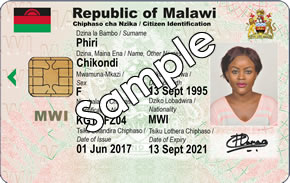Until 8th January 2010, there was no law in Malawi compelling citizens, especially indigenous Malawians, of all ages to compulsory register with a government department and be issued with any form of identity, be it birth certificate of national identity card.
The 1904 Births and Deaths Registration Act only governed the registration of births and deaths largely as a voluntary activity. The Act, as the name suggests, left out registration for identity cards.
Section 18 of the 1904 Births and Deaths Act made it mandatory to register all children in Malawi born of parents from Europe, America or Asia, and voluntary for all children born of African decent, or simply put, indigenous Malawians.
The glaring inequalities as depicted by this Colonial Act, and the fact that Malawi was the last country in the Southern Africa region for its citizens to have National Identity Cards, gave rise to the formulation, deliberation, the subsequent passing by the Parliament and the assenting into law the National Registration Act of 2010 which in effect repealed the 1904 Births and Deaths Registration Act.
Thus, the National Registration Act of 2010 introduces the universal and compulsory registration of all births and deaths (regardless of race or nationality) for the issuance of birth or death certificates as well as registration of every citizen of 16 years and above for the issuance of National Identity Cards (for Malawians) or Foreign Resident Identity Card (for resident foreigners).
Apart from modifying and introducing the new registration mandate in Malawi, the 2010 Registration Act also moved the registration functions from the Registrar General’s Department to the newly formed National Registration Bureau (NRB) from August 1, 2015. So far, the Registrar General’s Department is yet to handover the registration of marriages to NRB.
The question therefore is: what is the NRB mandate? As indicated above, NRB is mandated by the National Registration Act of 2010 to implement, coordinate, manage and maintain the National Registration and Identification System (NRIS) for Malawi.
Simply put, NRB is the only government department in Malawi mandated to register all births, deaths, marriages, citizens and non-citizens of 16 years and above for the issuance of respective identification documents such as certificates and identity cards (IDs).
In order to implement this mandate, NRB has 28 District Registration Offices (at every District Commissioner’s Office), Three City Registration Offices (Blantyre, Lilongwe and Mzuzu), and 33 functional Post Offices across Malawi.
Periodically, NRB conducts Outreach Registration exercises in school centres targeting rural and hard-to-reach communities across the country.
In terms of births and deaths registration, NRB also uses all government and Christian Health Association of Malawi (CHAM), and other private health facilities as registration points for either newly born babies or hospital deaths as the case may be.
According to the NRB establishment warrant, the institution has a total of 577 employees across the country to serve the current population on all matters of registration be it new births, deaths, national IDs or replacements for the same. A functional review on the NRB establishment is underway to establish additional registration points, among others, to serve the population better.
It should be noted, therefore, that the main objectives of setting up NRB are to: improve internal security by facilitating positive identification of Malawians, and resident foreigners; facilitate continuous capture of demographic data through compulsory birth and death registration; and improve the socioeconomic planning process by providing up-to-date population information, among other objectives.
As such, the mandate of NRB correlates very well with national development. Even the Malawi 2063 vision places national registration linkages with all digital platforms for ease of personal identification as one of the key attributes for national development.
Where are we in terms of service delivery? For purposes of this article, the concentration is on National IDs registration, printing and distribution.
As a background, Malawian citizens registered for National IDs for the first time through mass registration exercise in 2017. The IDs were printed outside the country and distributed en masse in 2018.
After the mass registration exercise, NRB immediately commenced continuous registration in all its registration points across the country with printing of the cards at NRB Headquarters in Lilongwe.
An estimated 500,000 ID cards were to be printed annually. However, an increase in the breakdown of printers coupled with overwhelming numbers of replacements, increased the backlog of unprinted records in the National ID system. This has greatly affected service delivery.
NRB has taken remedial steps to address this gap. The institution has ordered a new medium-to-heavy duty printer and installation is underway. The process to print the backlog outside the country is at an advanced stage. NRB now has installed new and high capacity servers. Therefore, the citizenry should expect an improved service delivery on National IDs registration, printing and distribution in 2024.
By Norman Clement Fulatira

